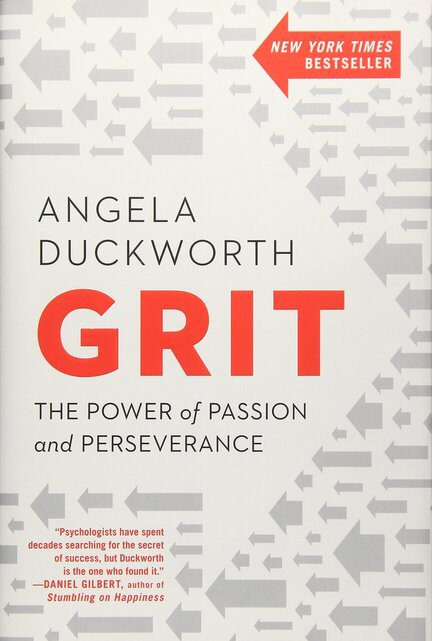“To be gritty is to keep putting one foot in front of the other. To be gritty is to hold fast to an interesting and purposeful goal. To be gritty is to invest, day after week after year, in challenging practice. To be gritty is to fall down seven times, and rise eight.”
In Grit: The Power of Passion and Perseverance, psychologist, and author Angela Duckworth shows anyone striving to succeed—be it parents, students, educators, athletes, or business people—that the secret to outstanding achievement is not talent but a special blend of passion and persistence she calls “grit.
Angela’s TED talk is among the most-viewed of all time. She is the co-host, with Stephen J. Dubner (co-author of the Freakonomics books) of the podcast No Stupid Questions.
Grit
Grit isn’t just working incredibly hard. That’s only part of it. Well, for one thing, there are no shortcuts to excellence. Developing real expertise, figuring out really hard problems, it all takes time—longer than most people imagine. And then, you know, you’ve got to apply those skills and produce goods or services that are valuable to people. Rome wasn’t built in a day. And here’s the really important thing. Grit is about working on something you care about so much that you’re willing to stay loyal to it.
“Enthusiasm is common. Endurance is rare.”
On Quiting
When people drop out of things, they do so for a reason. Actually, they do so for different reasons. Any of the following four thoughts might go through your head right before you quit what you’re doing:
- “I’m bored.”
- “The effort isn’t worth it.”
- “This isn’t important to me.”
- “I can’t do this, so I might as well give up.”
Paragons of grit quit goals, too. But the higher the level of the goal in question, the more stubborn they are about seeing it through. Most important, paragons of grit don’t swap compasses: when it comes to the one, singularly important aim that guides almost everything else they do, the very gritty tend not to utter the statements above.
“Together, the research reveals the psychological assets that mature paragons of grit have in common. There are four. They counter each of the buzz-killers listed above, and they tend to develop, over the years, in a particular order.
Interest
First comes interest. Passion begins with intrinsically enjoying what you do. Every gritty person I’ve studied can point to aspects of their work they enjoy less than others, and most have to put up with at least one or two chores they don’t enjoy at all. Nevertheless, they’re captivated by the endeavor as a whole. With enduring fascination and childlike curiosity, they practically shout out, “I love what I do!
Practice
Next comes the capacity to practice. One form of perseverance is the daily discipline of trying to do things better than we did yesterday. So, after you’ve discovered and developed interest in a particular area, you must devote yourself to the sort of focused, full-hearted, challenge-exceeding-skill practice that leads to mastery. You must zero in on your weaknesses, and you must do so over and over again, for hours a day, week after month after year. To be gritty is to resist complacency. “Whatever it takes, I want to improve!” is a refrain of all paragons of grit, no matter their particular interest, and no matter how excellent they already are.
Purpose
Third is purpose. What ripens passion is the conviction that your work matters. For most people, interest without purpose is nearly impossible to sustain for a lifetime. It is therefore imperative that you identify your work as both personally interesting and, at the same time, integrally connected to the well-being of others. For a few, a sense of purpose dawns early, but for many, the motivation to serve others heightens after the development of interest and years of disciplined practice. Regardless, fully mature exemplars of grit invariably tell me, “My work is important—both to me and to others.
Hope
And, finally, hope. Hope is a rising-to-the-occasion kind of perseverance. It defines every stage. From the very beginning to the very end, it is inestimably important to learn to keep going even when things are difficult, even when we have doubts. At various points, in big ways and small, we get knocked down. If we stay down, grit loses. If we get up, grit prevails.
The four psychological assets of interest, practice, purpose, and hope are not You have it or you don’t commodities. You can learn to discover, develop, and deepen your interests. You can acquire the habit of discipline. You can cultivate a sense of purpose and meaning. And you can teach yourself to hope.
One Step at a time
Experts and beginners have different motivational needs. At the start of an endeavor, we need encouragement and freedom to figure out what we enjoy. We need small wins. We need applause. Yes, we can handle a tincture of criticism and corrective feedback. Yes, we need to practice. But not too much and not too soon. Rush a beginner and you’ll bludgeon their budding interest. It’s very, very hard to get that back once you do.
For the beginner, novelty is anything that hasn’t been encountered before. For the expert, novelty is nuance.
On your own, you can grow your grit “from the inside out”: You can cultivate your interests. You can develop a habit of daily challenge-exceeding-skill practice. You can connect your work to a purpose beyond yourself. And you can learn to hope when all seems lost.
You can also grow your grit “from the outside in.” Parents, coaches, teachers, bosses, mentors, friends—developing your personal grit depends critically on other people.
All the Best in your quest to get Better. Don’t Settle: Live with Passion.



1 Comment
Pingback: 100 Books Reading Challenge 2022. | Lanre Dahunsi